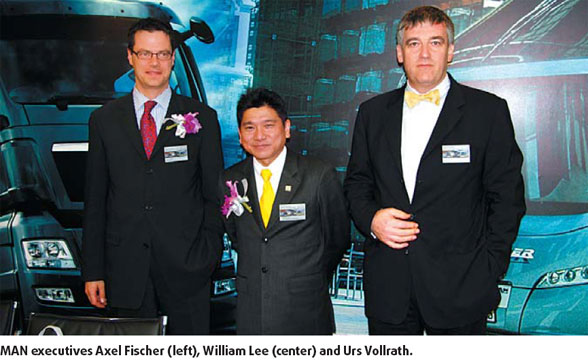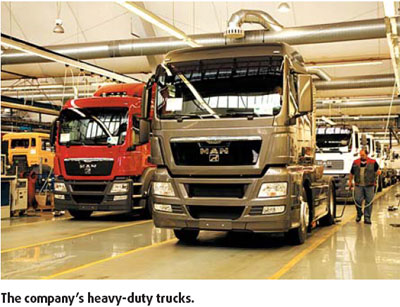


To mark the 25th anniversary of its drive into China, commercial vehicle maker MAN Nutzfahrzeuge Group says it wants to pave the way for a new kind of cooperation with Chinese partners.
"Commercial vehicles from MAN have been a feature of China's roads for decades, with more than 70 percent of MAN and Steyr trucks made under license in the country," says Urs Vollrath, president of MAN Truck and Bus (China).
Yet joint venture production remains elusive for the German company.
After contacting nearly all major Chinese truck makers, no deal on a joint venture has yet been sealed. Instead, MAN headquarters for the Asia-Pacific region was opened in Bangkok last month under the management of a Chinese Singaporean.
But the search for a partner is on. When asked, Peter Erichreineke, member of the executibe board of MAN Nutzfahrzeuge AG in charge of sales and marketing, would not deny that Weichai Power based in Weifang of Shandong province, the nation's biggest engine producer, is a potential partner.
"MAN has until not too long ago set its main focus of business expansion primarily in Europe where it has grown into one of the largest manufacturers of premium medium and heavy commercial vehicles," says William Lee, CEO of MAN Truck & Bus Asia Pacific Co Ltd.
"Growing further means MAN must have considerably more engagement overseas."
The company has laid plans to not only adjust its sales and service strategies but says it is also creating a product portfolio to meet a wider range of regional market demands.
In mapping out a new approach, MAN will change its long-standing operating procedures.
"The main objective in that context is to be closer to local importers, distributors and customers and be able to see the market trends early enough to make adjustments that may be required," says Lee.
To meet the challenge MAN's Asia-Pacific headquarters established in Bangkok will manage its business in some 56 countries of the Asia-Pacific region.
"The fact that MAN opened this office in Asia is a clear indication it has realized the importance of the Asia market," says Lee. "And undoubtedly China is our focus."
"It's also a signal that MAN is preparing the localization in Asia," says Lee, the first ethnic Chinese senior executive at the company. "That means I will spend more time in China, and communicate with partners on future cooperation in Chinese."
Lee has visited China for five times during the past three months. "We also have a production base in India, which is our second strategic market in the near future," he says, explaining why its regional office was located in Thailand instead of China.
"But we will not sell made-in-India trucks in the China market, but inside India, Vietnam, Iran, Iraq and African countries," says Vollrath. "The quality and technology of trucks in China has far surpassed that of India and other Asian countries and they continue to develop rapidly.
"We have a very clear product strategy for heavy-duty trucks, with the first level of products mostly produced in Europe, and a second level of joint venture trucks which we hope to manufacture in China and the third in India," says Erichreineke.

"The third market already exists in China, for example the low-end trucks under 200,000 yuan per unit," he says. "I believe that in the next three to five years, sales of premier products priced at more than 400,000 yuan per unit will not increase, maintaining the annual number of about 10,000 units, only accounting for 3 to 4 percent of the total market."
"As a result, we are targeting the segment with trucks priced between 200,000 and 400,000 yuan made at a joint venture to begin local production with lower costs and competitive prices."
"To make full preparation we have to increase investment, both in talent and our distribution and service network," he adds.
In October, MAN will open a sales, service and spare parts center in Guangzhou, and is planning for outlets in Urumqi, capital of Xinjiang Uygur autonomous region, and Sichuan province.
"We plan to build more service centers to lay a distribution and network for our premier imported trucks as well as locally made vehicles," says Axel Fischer, the vice-president of MAN Truck and Bus China.
MAN began operation in China in 2004, but its name has been known in the Chinese market for more than 20 years through its transfer of technology. The company now sells German-made commercial vehicles and diesel engines in China, and has many successful projects of bus by licese-cooperation.
Last year it sold 500 imported heavy-duty trucks from Germany, about 13 percent of total European commercial truck imports.
"We aim to raise the market share to 20 percent in the next two to three years," says Lee.
The 2007 output by MAN was 93,000 trucks and 7,500 buses. The German group has set a target to manufacture 185,000 heavy-duty trucks and 15,000 buses by 2015.
"For Asia Pacific market, we have the sales target of 40,000 units, with a projected 25,000 in the China market," says Lee.
(China Daily 01/21/2008 page6)













